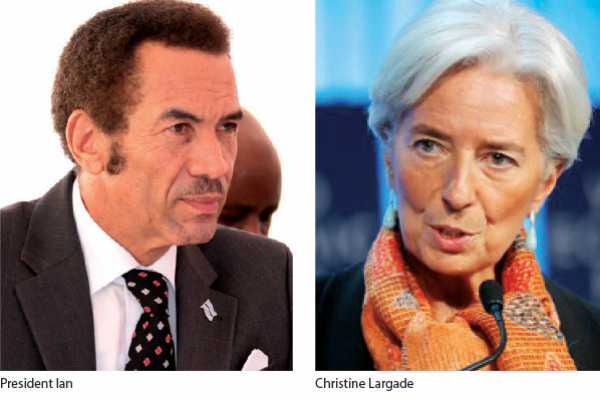Economy safe from external shocks-IMF
Anumber of policies that the current government has come up with in recent times have the potential to create the much-needed jobs and diversify the economy, but there is need for commitment by those entrusted with power.
This is the message that is coming out loud and clear from the multilateral lender, International Monetary Fund (IMF), in their note to the Southern African country which has technically entered a recession for the first time since the economic slowdown of 2008. This latest praise from IMF is perhaps a relief for the government, which has in the past been bashed by the Washington-based lender for keeping a ‘bloated civil service and lacking in diversity’.
In the recent past the mining-rich economy has passed the Special Economic Zones Act, which among others will ensure that regional-based economic opportunities are identified and benefit the local communities. The Act also calls for favourable tax rates for companies which will choose to invest in SEZs. Under the SEZs Act, it will be less cumbersome for companies to apply for such things as licensing and land for operation.
This development, according to a team of IMF economists led by Enrique Gelbard, will go a long way in ensuring that the country expands at a much faster rate and attains the status of a high income economy. However, the team that spent two weeks in Botswana last December said the country must also be cautious on tax incentives, which will be extended to companies setting up in SEZs.
Current President and a former army commander, Ian Khama, who is also the SADC chairperson has announced a historic Economic Stimulus Package (ESP) whose main focus is to boost economic activities in the landlocked country. The Plan includes tapping into foreign reserves to fund projects in construction, agriculture and manufacturing sectors, among others.
After muted economic growth, it will seem the economy will bounce back in the medium term. This is if the IMF team is to be believed. “Economic growth is projected to pick in the next couple of years, supported by the gradual recovery in the global diamond market, low domestic rates and the impact of the government’s stimulus package program,” said the report which is contained in the IMF website.
The country is planning a number of medium term measures aimed at picking its social and economic status, which will be included in the next National Development Plan (NDP) 11. These include efficiency in public investments, Public Private Partnerships (PPPs), establishing independent regulators, improving the quality of water and power supplies, reducing skills mismatch as well as enhancing profitability in state companies.
Government has announced plans to invest in high-value projects through its investment arm - Botswana Development Corporation (BDC). It has also established the Human Resources Development Council (HRDC) to ensure that the education sector services the labour market with right graduates.
While government’s PPP initiative is off to a slow start, more and more regulators are in the offing such as the water and electricity authority. “The above reforms, together with a gradual scaling up of public investment over the next decade, have the potential to generate employment and diversify the economy away from diamonds,” noted the IMF, whose head office is under the watch of Christine Largade. Botswana, like most commodity exporting nations, is currently experiencing a slide in external revenues.
For a country like Botswana, which depends on diamonds for its national budget, this development could put it on slippery ground. The fall in commodity prices has been caused by China’s reduction in metals orders caused by a slowing economy. However, the IMF team believes there is no need to press panic buttons yet as the country is well positioned to stem such external challenges.
“Thanks to a sizeable fiscal and foreign exchange savings, the country is well-positioned to weather the current slowdown,” stated the report. However, the team emphasised that any government Thebe spent on projects has to be for a worthy cause such as for promotion of growth and human capital.
During their stay in Botswana the team met with finance and development planning minister, Kenneth Matambo, his Permanent Secretary Solomon Sekwakwa, Bank of Botswana Governor, Linah Mohohlo, senior government officials and representatives of the private sector and development partners.
In another development, Matambo’s ministry is busy putting final touches to the 2016/7 budget speech, which will be presented early next month. The budget comes in the backdrop of a tight economic landscape coupled with deficits, slow economic growth and declining mining revenues.





